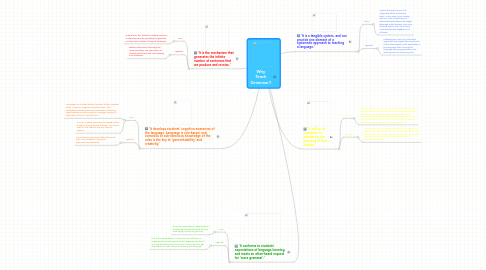
1. 'It conforms to students' expectations of language learning, and meets an often-heard request for 'more grammar'.'
1.1. For?
1.1.1. Some sts' expectations. Especially the analytically-minded will profit from (& even enjoy) a focus on grammar.
1.2. Against?
1.2.1. Not all sts' expectations. Those who are not keen on analysing the formal aspects of the language may find it as a big stumbling block to surpass. They may even get demotivated & lose interest in learning the language.
2. 'It is the mechanism that generates the infinite number of sentences that we produce and receive.'
2.1. For?
2.1.1. Grammar as the 'sentence-making machine': it offers learners the possibility to generate an enormous number of original sentences.
2.2. Against?
2.2.1. Patterns alone are not enough for communicating. You need lexis, as content words carry the real meaning in an utterance.
3. 'It develops students' cognitive awareness of the language. Language is rule-based, and conscious or sub-conscious knowledge of the rules is the key to 'generalizability' and creativity.'
3.1. For?
3.1.1. Languages are indeed abstract systems at their deepest levels. Grammar organises 'what we teach' thus facilitating & assisting learners' processes of noticing, hypothesizing & structuring their language learning. It helps them focus on 'what to learn'.
3.1.2. In an FL context, grammar can speed up the times for acquiring new features. We cannot wait for 'the need to acquire' them to appear.
3.2. Against?
3.2.1. Some learners may find it difficult to work with a too analytical / structural approach (too abstract?).
4. 'It is a tangible system, and can provide one element of a systematic approach to teaching a language.'
4.1. For?
4.1.1. It gives the appearance of an organised whole to what we teach. In this way, it can comply with our roles of facilitators & intermediaries between the target language & the learners. This is on the assumption that not all input can be processed together & at all times.
4.2. Against?
4.2.1. Following too much of a structural approach may neglect the importance of the other systems and, especially, of the language skills, turning the language learning experience into learning rules as its primary aim.
5. 'It will be of assistance to teachers in the planning of their lessons.'
5.1. For?
5.1.1. It enables teachers to keep track of what structures they will teach and which structures learners have been taught in the classroom. Thus planning will be more consistent and progressive. Besides, planning and evaluating the outcomes for a lesson with a view to a specific grammatical feature is easier than planning a skills or task based lesson.
5.2. Against?
5.2.1. Lessons planned on a grammatical basis may neglect the fact that the language skills need to be developed in the same way, or even more. Learners may end up having high degrees of accuracy, but will have deficiencies in communicative skills.
